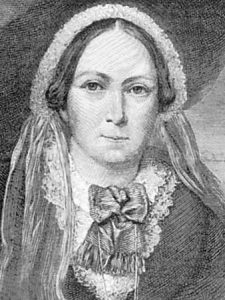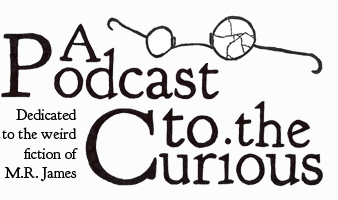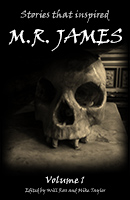 Have you ever had a hankering for upping sticks and moving overseas, where one’s limited means might stretch a little further and the wine flow more freely? This week Will and Mike head for the north coast of France in Featherston’s Story, where Mrs Henry Wood shows us that expat life is not always baguettes, brie and “la bonne vie”…
Have you ever had a hankering for upping sticks and moving overseas, where one’s limited means might stretch a little further and the wine flow more freely? This week Will and Mike head for the north coast of France in Featherston’s Story, where Mrs Henry Wood shows us that expat life is not always baguettes, brie and “la bonne vie”…
Show notes:
- MR James wrote in ‘Some Remarks on Ghost Stories” that “I own to reading not infrequently ‘Featherston’s Story’ in the fifth series of Johnny Ludlow, to delighting in its domestic flavour and finding its ghost very convincing. (Johnny Ludlow, some young persons may not know, is by Mrs Henry Wood)”.
- Mrs Henry Wood (or Ellen) began to published her Johnny Ludlow supernatural tales in 1868. She did so anonymously (or rather under the name ‘Johnny Ludlow’) in ‘The Argosy’, a magazine that she had taken over editorship of the year before. The website mrshenrywood.co.uk is a fantastic resource if you would like to find out more about her prolific writing career.
- Ellen Wood admitted the stories were written by herself in the introduction to the first Johnny Ludlow anthology, published in 1880. She claimed that she wrote them under a pseudonym because using her own name would have destroyed the illusion that they were true accounts of things that happened to the male protagonist.
- The Ludlow stories are quite well known today for their supernatural content, but the paranormal only featured in a small number of the Ludlow stories. These were more commonly crime, adventure or romance stories (of the 80 individually named Ludlow stories, only 17 feature the supernatural). They were packed full of characters, perhaps over a thousand in total.
- Featherston’s Story was published after Ellen Wood’s death and is one of the last of the Johnny Ludlow tales. There’s a full list of Ludlow stories online, with a very brief summary of themes for each.
Podcast: Play in new window | Download
Subscribe: RSS








After dragging myself through this story I think there is only one question you can ask: what was your favourite superfluous incident or character? For me the answer is obvious, it just has to be Ms James. Who is Ms James you ask? You can’t remember who is she? To which I answer, of course you can’t, that is what encapsulates her genius.
Ms James is -bien sûr- the wife of Captain Fennel’s brother. She appears, we are treated to random remarks upon her character, we hear her opinion on the ghostly matters and then… she sashays back on to the ferry (the one that we are all so familiar with at this point that we have probably learnt the timetable for through some sort of literary osmosis) and is promptly never heard of again.
I also enjoyed the captain’s fitting end. Not that he gets any comeuppance of course but because that he, unlike every other character in this story, gets to travel on a boat that’s isn’t moving between England and France but is actually going somewhere else entirely. A radical departure in more ways than one.
Love the podcast guys but if you ever cover this author again I will be the one haunting you and no regular ferry service will save you from my wicked speed.
A few thoughts… First, the readings were excellent, and would have inspired me to read the story – if not for the rest of the podcast. Regarding why Monty would have praised this and other stories today’s readers might not appreciate, I think we need to step back and put the question in context. Most of the best-selling authors of the 19th century are either ignored or unknown today. We can either believe that people didn’t know good writing in ye olden days, or we can allow that there’s more to the difference of opinion than that. Bulwer-Lytton is considered largely unreadable today. I certainly can’t stick with more than a chapter at best. But then I also can’t imagine sitting through an hour long sermon, much less two hour long sermons in a single day. Yet these were common in the 19th century.
More to the point, I think we make a mistake when we follow the logic ‘We like Monty’s writing, therefore we should like what Monty liked.’ To make an analogy that is more contemporary, most of the jazz musicians of the last 50 years have loved the playing of Charlie Parker, while most made a conscious effort NOT to sound like him. And even the avant-garde players would have listened to Bird at home, while playing nothing like him at all.
In the end, I think that we can say is that there were stories Monty liked, and we like Monty’s stories. And while it’s worth following up on what might have shaped his writing, we shouldn’t be surprised if any links are tenuous at best. He was a creative writer, and his work was his own, not just elaborations on an earlier model.
Thank you for sharing all of this!
To me, puzzling out what made Victorian and Gothic writing popular and appealing, and what that tells us about/how it lets us inhabit the mindset of readers at that time, is a major part of the experience. If you don’t enjoy that, you probably want to stick to the best-ofs rather than trying to trace influence through generations.
Also, I’m a new listener so this might be common knowledge that you just haven’t gotten to in the podcast yet: now that I know more about the tropes James used, Robert E Howard’s Cairn on the Headlands, which I’d previously just looked at as the outer fringe of his historical fiction writing, appears to be his deliberate take on the antiquarian ghost story. Do we know if this was a direct homage to James?
This highly entertaining episode sent me off to read the story, which I managed to unearth from Mrs HW’s voluminous collected works. As you rightly say, as a ghost story it is a failure. Taken for what it is, a minor piece of late nineteenth century fiction, it is an interesting read; rather like Crawford, relocated to Normandy, and with a murder thrown in.
Two matters are worth mentioning: first, Mrs HW’s main claim to fame is as the author of East Lynne, probably the only one of her books which has remained in print. This classic of Victorian sensation fiction contains the much parodied line: “Dead! Dead! And never called me mother!”
Second, the swindler who preys on single ladies for their modest annuities or savings really existed in the late 19th century. George Joseph Smith, notorious for the “Brides in the Bath” murders, started his career by swindling a succession of such women, sometimes marrying them bigamously first. Samuel Herbert Douglas did the same thing to several women before marrying a 60 year old spinster, Camille Holland, and murdering her in what became know as the Moat House Farm murder. In this period there were estimated to be about 500,000 more women than men in the UK. For middle-class women the only alternative career to marriage was teaching. There were a lot of Miss Preens about, trying to manage on a tiny income and still hoping a husband might turn up. Anne/Nancy was not the only one to be taken in.
In the comment I’ve just left, please substitute Crawford for Crawford!
Spellcheck madness! Cranford!
Hello Guys,
Really like your podcasts! The reason I’m contacting you is, that I came across this a week or so ago, and was wondering if you had seen it?
It’s a ten minute independent short of, “Whistle And I’ll Come To You”, from 1956. I’ve never heard of it myself, and couldn’t find any real info about it. Definitely worth a look, if only from the curio point of view.
Personally, I found it pretty good for what it is.
https://player.bfi.org.uk/free/film/watch-whistle-and-ill-come-to-you-1956-online
This story is availabe at Project Gutenberg in the “Johnny Ludlow, Fifth Series” collection, . I enjoyed it in a quiet way, even Charley Palliser.